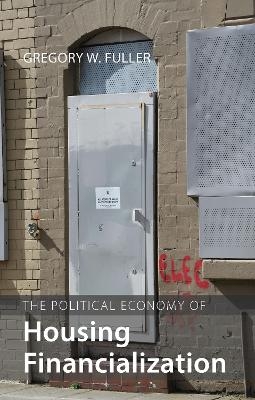
The Political Economy of Housing Financialization
Seiten
2019
Agenda Publishing (Verlag)
978-1-78821-100-0 (ISBN)
Agenda Publishing (Verlag)
978-1-78821-100-0 (ISBN)
Greg Fuller explores the importance and growing role of mortgage markets in the macroeconomy and provides a comparative analysis of housing finance across a number of European national economies, including the UK, as well as the United States.
The US subprime mortgage crisis, by nearly causing the collapse of the global financial system during the 2007–08 financial crisis, clearly revealed that household debt management is critical to the stability of the international economy. The configuration of mortgage finance systems of European economies, from the UK to Sweden to Spain, have profound effects on national macroeconomic and political outcomes.
In this book, Gregory Fuller reveals how national housing systems diverge in terms of their commodification and financialization: mortgages are far more common in some systems than others; some encourage families to treat housing as a tradeable asset while others do not; and certain states provide extensive social housing programmes while others offer virtually none. These differences are shown to have an impact on households’ economic precarity, macroeconomic volatility, and ultimately on their political preferences. Drawing on these comparisons, Fuller offers a number of policy suggestions intended to weaken the links between housing, economic instability, and inequality.
The US subprime mortgage crisis, by nearly causing the collapse of the global financial system during the 2007–08 financial crisis, clearly revealed that household debt management is critical to the stability of the international economy. The configuration of mortgage finance systems of European economies, from the UK to Sweden to Spain, have profound effects on national macroeconomic and political outcomes.
In this book, Gregory Fuller reveals how national housing systems diverge in terms of their commodification and financialization: mortgages are far more common in some systems than others; some encourage families to treat housing as a tradeable asset while others do not; and certain states provide extensive social housing programmes while others offer virtually none. These differences are shown to have an impact on households’ economic precarity, macroeconomic volatility, and ultimately on their political preferences. Drawing on these comparisons, Fuller offers a number of policy suggestions intended to weaken the links between housing, economic instability, and inequality.
Gregory W. Fuller is Assistant Professor of International Political Economy at the University of Groningen, the Netherlands. He is the author of The Great Debt Transformation (2016).
Foreword by Erik Jones1. Housing and the great debt transformation2. Housing and financialization3. Housing and macroeconomic instability4. Housing and inequality5. Housing and politics6. Housing and the future
| Erscheinungsdatum | 08.09.2019 |
|---|---|
| Reihe/Serie | Comparative Political Economy |
| Verlagsort | Newcastle upon Tyne |
| Sprache | englisch |
| Maße | 138 x 216 mm |
| Themenwelt | Wirtschaft ► Betriebswirtschaft / Management ► Rechnungswesen / Bilanzen |
| Betriebswirtschaft / Management ► Spezielle Betriebswirtschaftslehre ► Immobilienwirtschaft | |
| Wirtschaft ► Volkswirtschaftslehre ► Wirtschaftspolitik | |
| ISBN-10 | 1-78821-100-6 / 1788211006 |
| ISBN-13 | 978-1-78821-100-0 / 9781788211000 |
| Zustand | Neuware |
| Haben Sie eine Frage zum Produkt? |
Mehr entdecken
aus dem Bereich
aus dem Bereich
Handbuch für Studium und Praxis
Buch | Hardcover (2023)
Vahlen (Verlag)
79,00 €
Erfolgsstrategien für den modernen Immobilienmarkt
Buch | Softcover (2024)
ForwardVerlag
18,00 €
warum Rene Benkos Immobilienimperium zusammenbrach und was dem …
Buch | Hardcover (2024)
FinanzBuch Verlag
22,00 €


